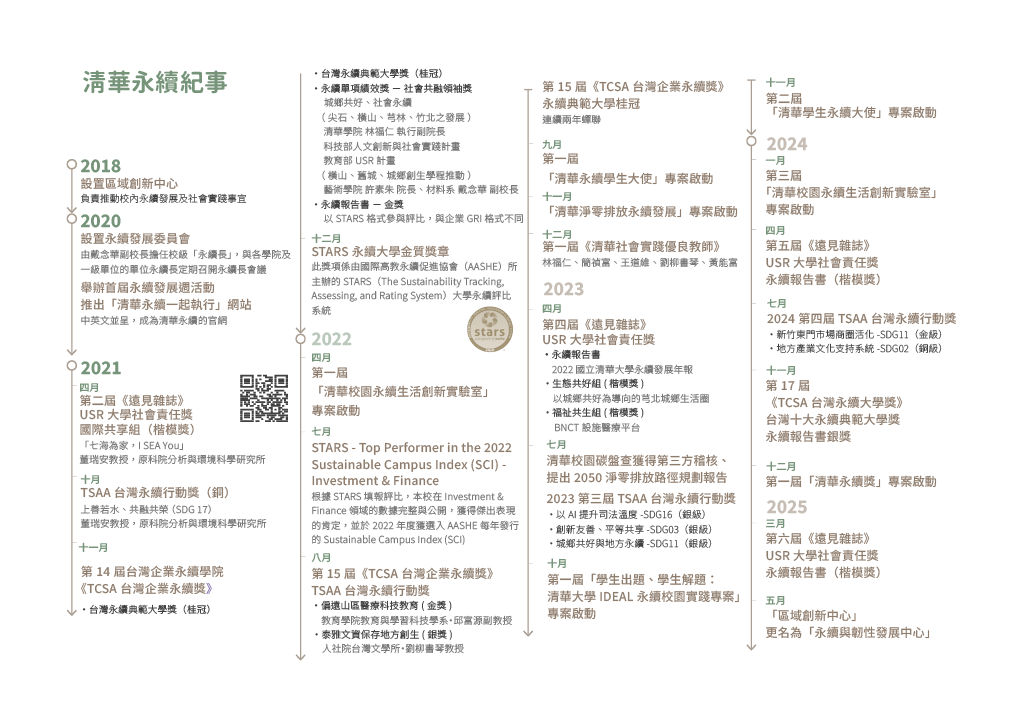2018
- 設置「區域創新中心」,負責推廣校內永續發展及社會實踐事宜。
2020
- 設置永續發展委員會,由各學院、一級行政單位永續長組成。
2023
- 以 STARS 永續評比系統、THE 大學影響力:2023–2024 年連續兩屆《遠見雜誌》USR 大學社會責任獎、TSAA 台灣永續行動獎;第 16 屆 TCSA 台灣企業永續獎:永續典範大學桂冠。
- SDGs 自動標註系統:促進教師覺知自己的學術領域能對永續發展做出的潛在貢獻。
- 舉辦永續發展系列活動,喚起師生實現永續發展目標的動能。
- 區域整合平台:奠基新竹學,串連整合學校、企業、團體與縣市政府,建構平台。
2024
- 連續兩年(2023–2024)完成全校碳盤查及第三方稽核。
- 與新竹市政府簽署永續發展合作備忘錄、新竹縣政府簽署地方創生合作備忘錄,連結縣/市府與校方資源,發揮影響力、共構三方合作平台,推動大新竹發展。
- 清華首度規劃微電網系統,旨在強化能源韌性與自主性,結合太陽能與教學研究,展現永續轉型願景,後續待適當時機推動。
- 第四期教育部大學社會責任(USR)計畫獲 4 件補助,包含一件大學特色永續型計畫、三件萌芽型計畫、社會投資報酬率(SROI)推廣補助,持續深耕大新竹區域,擴大清華社會影響力。
2025
- 5 月 1 日改隸秘書處,更名「永續與韌性發展中心」。
- 制訂清華 2050 淨零排放路徑。
- 成立校園碳盤查推動小組,建立自主能力及校園文化。
- 培育地方行動者:城鄉創生學程、教育部 USR 計畫與 USR-Hub 計畫,師生走進城鄉,問題探索與積極行動。
- 推動園區 ESG:與竹科企業協力,打造地方產業與文化支持系統,改善城鄉環境。

2018
- Established the Regional Innovation Center, responsible for promoting sustainability development and social practice initiatives on campus.
2020
- Established the Sustainable Development Committee, composed of sustainability leaders from each college and first-level administrative unit.
2023
- Recognized by STARS Sustainability Rating System and THE University Impact Rankings.
- Received the USR University Social Responsibility Award by Global Views Monthly (2023–2024, two consecutive years).
- Honored with the Taiwan Sustainability Action Awards (TSAA) and the 16th Taiwan Corporate Sustainability Awards (TCSA) as a Sustainable Model University.
- Developed the SDGs Auto-Tagging System to help faculty recognize how their academic work contributes to sustainable development.
- Held a series of sustainability-themed events to inspire faculty and students to actively engage in the SDGs.
- Launched a Regional Integration Platform, grounded in the "Hsinchu Studies" initiative, connecting the university with industries, organizations, and local governments.
2024
- Completed university-wide carbon inventory and third-party audits for two consecutive years (2023–2024).
- Signed Sustainability Collaboration MOUs with Hsinchu City Government and Local Revitalization MOUs with Hsinchu County Government, creating a tri-sector partnership platform to drive sustainable development in Greater Hsinchu.
- Initiated Tsinghua's first Microgrid System, integrating solar energy with teaching and research, aiming to enhance energy resilience and autonomy. Full implementation planned for a future appropriate phase.
- Secured four grants under the Ministry of Education’s Phase 4 USR Program, including one flagship sustainable university project, three seed-stage projects, and a Social Return on Investment (SROI) promotion grant. These efforts deepen engagement in Greater Hsinchu and expand Tsinghua’s social impact.
2025
- On May 1, restructured under the Office of the Secretariat and renamed the Resilient and Sustainable Development Center (RSDC).
- Formulated Tsinghua’s Pathway to Net Zero Emissions by 2050.
- Established the Campus Carbon Inventory Task Force, promoting capacity-building and embedding sustainability into campus culture.
- Fostered local change agents through the Urban-Rural Regeneration Program, USR Projects, and the USR-Hub Initiative, encouraging faculty and students to engage communities through problem exploration and proactive action.
- Promoted ESG Initiatives in the Hsinchu Science Park, partnering with local industries to build a support system for regional industries and culture, contributing to urban-rural environmental improvement.


